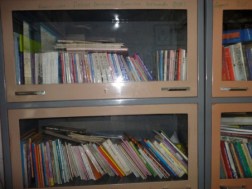Every last Friday of the month, the Rukmini Foundation holds a meeting of mentors (Didis – meaning older sisters in Nepali) and scholars (Bahinis – younger sisters). This is the platform where scholars can share their academic and personal progresses with their mentors. At the same time, they can also discuss about any difficulties in school as well as in their daily lives.

Recently, I had the great fortune of being able to attend such a meeting. The scholars were very surprised to see me because I was not scheduled for this meeting. The meeting had a quiet and slow start, but it became very lively as it progressed. Compared to my previous visits with the scholars, I found the scholars to be very vocal and open. It seems that the interaction the girls have had with their mentors is allowing them to be more open in their communications. After a few updates from the mentors, we came to the main topics of the day: how the scholars get more exposed to books and articles other the school textbooks.

The scholars expressed that there were not enough books available to them. When I asked the girls why they didn’t use the library one scholar responded by saying “how are we supposed to come to library and read when there are no books that interests us”? The lack of interesting and meaningful books was also raised during the first interactive Didi meeting. I looked around the library and saw stacks of books, however, like the scholars rightfully said, I could not find many books that seemed to be interesting for these high school students.
The library was full of obsolete computer programming books, science books that may be helpful to doctorate candidates, and old statistics books published by the government of Nepal. Needless to say, the options were limited for these young students.
The lack of meaningful books for the young students in Nepalese schools was also advocated by John Wood, founder of Room to Read. In his famous book “Leaving Microsoft to Change the World”, Wood describes the sorry state of the libraries of Nepalese schools. Since its inception, Room to Read has provided millions of useful books to Nepalese library and other Least Developed Countries.

While we may not be able to do what Room to Read is doing to improve the quality of books available at the library across the Nepal, but we can certainly do something about the sorry state of the library in Sikharapur School, where our scholars are studying.
We have already allocated a portion of our budget to procure books and magazine for this schooling year. This is part of our Gyan Program, which is our quality education initiative. In the near future, we will make a list of books and magazines that might be more interesting and meaningful to the scholars. We are planning to procure some of these books and magazines, and at the same time, we will also try to collaborate with different agencies which are working in Nepal, like Room to Read, to bring books that are more suitable for the students.
While it was great to see how much the scholars had improved in their ability to interact with others, there is still much work left. Providing relevant and interesting reading materials will be another huge step in improving the quality of education and also improving the scholars’ ability to utilize their critical reasoning and reading skills. We hope to stock this library full of interesting material because these scholars are hungry for knowledge and are looking forward to reading. We fully expect that by in future sessions like this, the girls will be presenting an article or book they read and what it means to them. Slowly but surely, our foundation is implementing all of the programs we promised. It is a very exciting time for us and for the girls of Rukmini Foundation.
In my next update, I will talk about the upcoming Health Seminar that the foundation is hosting with the help of local medical institutions.
Nabin
- Aftermath of 2023 Earthquake and Lending a Helping Hand - November 23, 2023
- Sowing the Seeds of Empowerment through Sewing - July 30, 2023
- Vaccinating students from COVID is the boost we need in Nepal - January 30, 2022
- Re-opening Act: To be or not to be in school in person - September 29, 2021
- A Gasp of Hope in the Fight Against COVID-19 - August 31, 2021

